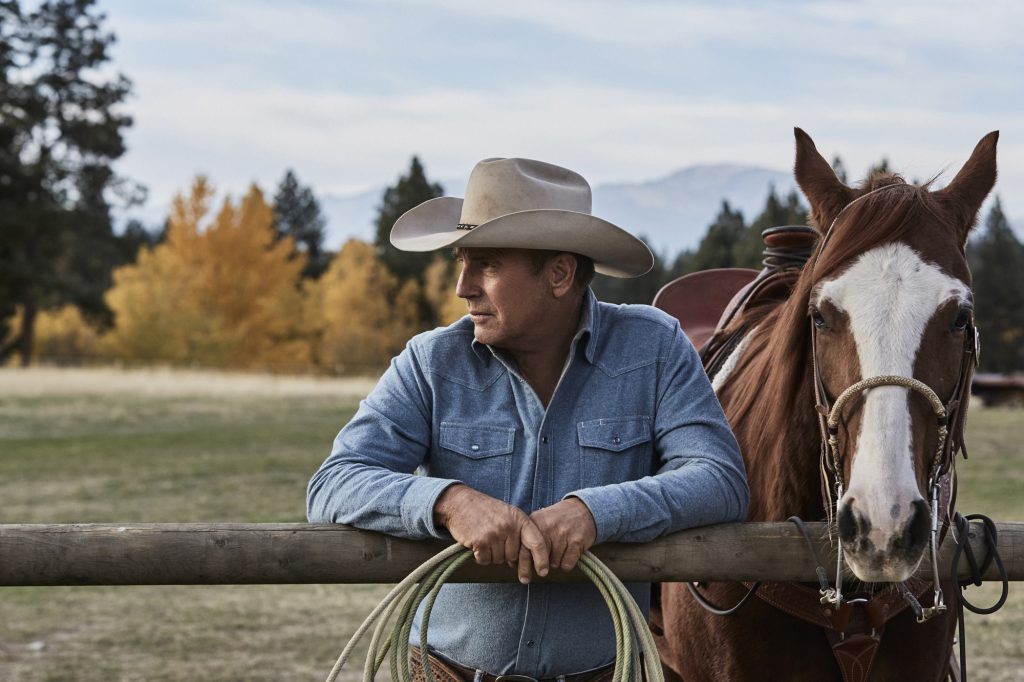
When I heard a few months ago that Kevin Costner was coming back to television, starring in a western taking place in Montana, that was called Yellowstone, it was so up my alley it was ridiculous. I’ve been a Costner fan for as long as I can remember – especially when his movies or tv shows have anything to do with baseball, horses, ranching, and cowboys. Silverado, Bull Durham, Field of Dreams, Dances with Wolves, Wyatt Earp, For Love of the Game, and Open Range defined my childhood and early adulthood moviegoing experiences. Of course, his non-baseball and non-cowboy movies are favorites as well including Robin Hood: Prince of Thieves, The Bodyguard, Tin Cup, and Draft Day. Even his smaller roles, in movies like Hidden Figures and Molly’s Game, show that sometimes men of few words can get a lot across.
But back to the west. Six days ago, Yellowstone premiered on the Paramount Network and it literally started with a bang. I had to look away but also had to remind myself that when a series begins with a tough scene and/or a tough first episode, there’s a reason. Usually, it’s foreshadowing a story that is going to be authentic and will keep the audience wanting more – i.e. Friday Night Lights. The two-hour first episode introduces the Dutton family whose cowboy patriarch is Costner. As a widower who controls the largest piece of ranch land in the United States, Dutton is constantly fighting to keep his land the way he wants it – much to the dismay of land developers who want to build condos and an Indian reservation that argues they were there first. In true Costner form, he plays Dutton as a no-nonsense man of few words who has a deep respect for land and animals but is also a tough son of a bitch.
Although the story of land preservation is nothing new, what is new is a western taking place in modern times. There’s branding, horse breaking, herding cattle (and buffalo), and guns galore, but there are also discussions of oil money, cutthroat moves in the board room, cell phones, and a private helicopter that takes Dutton anywhere and everywhere he needs to go. As with any good western, there are also family issues that run deep. We learn early on that Dutton’s wife is long gone but his four kids are grown and each seem to have their own agendas.
The family dynamic reminds me a little bit of Legends of the Fall as one son embraces the old school rancher lifestyle, another son is a lawyer and up-and-coming politico, and the third is a renegade horse whisper who is married to and has a son with a woman from the Indian reservation. Added to the mix is the only daughter who saunters back to Montana from her Salt Lake City boardroom like a Janis Joplin version of a CEO who throws back martinis, smokes, pops pills and clearly got her sharp tongue from her father. She also seems to be the only kid that Dutton gets along with which is odd and makes sense at the same time.
Clearly there is a lot of family backstory that hasn’t been revealed yet – especially the reasons behind the tension between Dutton and his sons and why his daughter is such a hot mess. In the first two hours I’ve already seen members of the family kill, dress down others literally and figuratively, and move a river. This family is no joke and they know it. Everyone knows it.
On a lighter note, the expansive landscapes, backdrops, and views are unparalleled. I spent ten summers of my life in Montana and there is no place like Paradise Valley – which also happens to be where this show takes place. All of that nature exudes freedom (and what Dutton ultimately is trying to protect) while the people living there both juxtapose and represent what it means to live and work in a place as rurally beautiful as Montana.


Leave a Reply